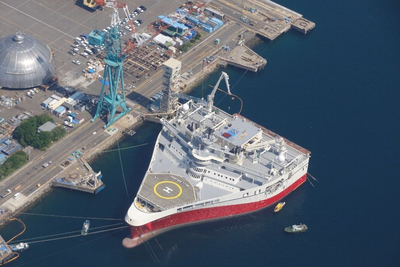In the world of marine seismic exploration, Ramform vessels have emerged as a groundbreaking technology, revolutionizing the way we understand and explore the Earth's subsurface. These vessels are known for their unique iron-shaped design, which optimizes their performance and efficiency. In this blog post, we will delve into the fascinating world of Ramform vessels, exploring their dimensions, the reasons behind their iron shape, other vessels of this class, and some of the remarkable discoveries they have already made.
The Dimensions of Ramform Vessels
Ramform vessels are massive and powerful ships, purpose-built to conduct seismic surveys in the open seas. They boast impressive dimensions, typically ranging from 70 to 100 meters in length and approximately 30 to 40 meters in width. Their expansive size allows them to carry a vast array of sophisticated equipment and personnel necessary for conducting cutting-edge seismic exploration.
The most notable aspect of their design is the "wide-tow" configuration, where the towing spread (the equipment used to generate and receive seismic signals) is spread far apart, significantly enhancing the quality and resolution of data collected. This unique arrangement ensures comprehensive coverage of the subsurface, enabling scientists and researchers to obtain highly accurate images of geological formations beneath the ocean floor.
The Iron Shape: Why it has such a Shape
The iron-shaped design of Ramform vessels is a result of meticulous engineering and innovation. The shape incorporates a specific purpose: minimizing wave resistance and maximizing stability, especially in rough sea conditions. The pronounced width and gradual narrowing of the hull reduce the impact of waves, preventing excessive rocking and ensuring a smooth, steady ride even in tumultuous waters.
Additionally, the iron-shaped hull offers increased deck space, allowing for more efficient placement and operation of equipment. This design consideration proves to be crucial, as seismic exploration requires a complex setup of machinery and instruments, all of which need to be carefully coordinated to achieve accurate results.
Other Vessels in the Ramform Class
The concept of Ramform vessels was pioneered by the seismic exploration company Petroleum Geo-Services (PGS). Over the years, PGS has developed several generations of Ramform vessels, each more advanced than its predecessor. Among the notable vessels in this class are:
a. Ramform Titan: Launched in 2013, Ramform Titan represents a milestone in seismic technology. With its cutting-edge features and enhanced towing capability, this vessel marked a significant leap forward in data acquisition and processing.
b. Ramform Hyperion: Following the success of Ramform Titan, PGS introduced Ramform Hyperion, a vessel designed to deliver even greater efficiency and productivity in seismic surveys. It combines state-of-the-art technology with the proven advantages of the Ramform design.
Remarkable Discoveries and Contributions
The implementation of Ramform vessels in seismic exploration has yielded numerous remarkable discoveries, greatly advancing our understanding of the Earth's subsurface. Some of the key contributions include:
a. Mapping Geological Structures: Ramform vessels have provided detailed and high-resolution images of the Earth's subsurface, leading to the discovery of various geological structures, including fault lines, sedimentary basins, and potential hydrocarbon reservoirs.
b. Unveiling Ancient Oceanic History: By analyzing seismic data collected by Ramform vessels, scientists have been able to reconstruct the history of ancient oceans, gaining insights into past climate conditions and the evolution of marine life.
c. Disaster Prevention: The data gathered by these vessels is instrumental in assessing potential geological hazards, such as underwater landslides or fault activities, aiding in disaster prevention and mitigation efforts.
Ramform vessels represent a groundbreaking achievement in the field of marine seismic exploration. Their impressive dimensions, iron-shaped hull, and advanced technology make them powerful tools for uncovering the Earth's geological secrets. With ongoing research and development, we can expect Ramform vessels to continue reshaping our understanding of the planet's subsurface and contribute significantly to the advancement of scientific knowledge in the years to come.









